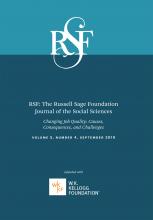Research Article
Open Access
Precarious Work Schedules as a Source of Economic Insecurity and Institutional Distrust
Susan J. Lambert, Julia R. Henly, Jaeseung Kim
RSF: The Russell Sage Foundation Journal of the Social Sciences September 2019, 5 (4) 218-257; DOI: https://doi.org/10.7758/RSF.2019.5.4.08
Susan J. Lambert
aAssociate professor in the School of Social Service Administration at the University of Chicago
Julia R. Henly
bProfessor in the School of Social Service Administration at the University of Chicago
Jaeseung Kim
cAssistant professor in the College of Social Work at the University of South Carolina

REFERENCES
- ↵
- Abramson, Paul, and
- Ronald Inglehart
- ↵
- Appelbaum, Eileen, and
- Rosemary Batt
- ↵
- Board of Governors of the Federal Reserve System
- ↵
- Carré, Francoise, and
- Chris Tilly
- ↵
- Clawson, Dan, and
- Naomi Gerstel
- ↵
- ↵
- De Witte, Hans, and
- Katharina Näswall
- ↵
- Edin, Kathryn J., and
- H. Luke Shaefer
- ↵
- Farrell, Diane, and
- Fiona Greig
- ↵
- Finnigan, Ryan
- ↵
- Frazis, Harley, and
- Jay Stewart
- ↵
- Fugiel, Peter J., and
- Susan J. Lambert
- ↵
- Gallup Organization
- ↵
- Gallup Organization
- ↵
- Golden, Lonnie
- ↵
- Gottschalk, Peter, and
- Robert Moffitt
- ↵
- Hacker, Jacob
- ↵
- Haley-Lock, Anna. and
- Stephanie Ewert
- ↵
- Hayes, Christopher
- ↵
- ↵
- Henly, Julia R.,
- H. Luke Shaefer, and
- R. Elaine Waxman
- ↵
- Huang, Guo-hua,
- Xiongyinig Niu,
- Cynthia Lee, and
- Susan J. Ashford
- ↵
- Jacobs, Jerry A., and
- Kathleen Gerson
- ↵
- Jones, Kerry
- ↵
- Kalleberg, Arne L
- ↵
- Kalleberg, Arne L., and
- Steven P. Vallas
- ↵
- Lambert, Susan J
- ↵
- Lambert, Susan J.,
- Anna Haley-Lock, and
- Julia R. Henly
- ↵
- Lambert, Susan J.,
- Julia R. Henly,
- Peter Fugiel, and
- Joshua Choper
- ↵
- Lee, Cynthia,
- Philip Bobko, and
- Zhen Xiong Chen
- ↵
- Lehndorff, Steffen, and
- Dorothea Voss-Dahm
- ↵
- Mas, Alexandre, and
- Amanda Pallais
- ↵
- Matos, Kenneth, and
- Ellen Galinsky
- ↵
- McCrate, Elaine
- ↵
- McCrate, Elaine
- ↵
- Morduch, Jonathan, and
- Rachel Schneider
- Perlow, Leslie A
- ↵
- Perlow, Leslie A
- ↵
- Pew Research Center
- ↵
- Pfeffer, Jeffrey, and
- Sanford E. DeVoe
- ↵
- Presser, Harriet B
- ↵
- Robinson, John P.,
- Alain Chenu, and
- Anthony S. Alvarez
- ↵
- Schneider, Daniel, and
- Kristen Harknett
- ↵
- Schor, Juliet
- ↵
- Sennett, Richard
- ↵
- Smith, Tom W.,
- Michael Davern,
- Jeremy Freese, and
- Michael Hout
- ↵
- Staines, Graham L., and
- Joseph H. Pleck
- ↵
- Standing, Guy
- ↵
- Weil, David
In this issue
Precarious Work Schedules as a Source of Economic Insecurity and Institutional Distrust
Susan J. Lambert, Julia R. Henly, Jaeseung Kim
RSF: The Russell Sage Foundation Journal of the Social Sciences Sep 2019, 5 (4) 218-257; DOI: 10.7758/RSF.2019.5.4.08





